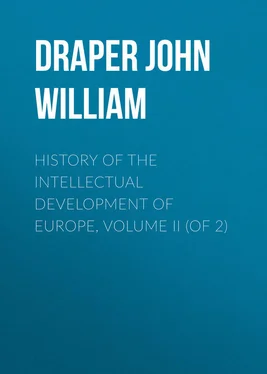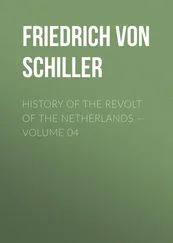John Draper - History of the Intellectual Development of Europe, Volume II (of 2)
Здесь есть возможность читать онлайн «John Draper - History of the Intellectual Development of Europe, Volume II (of 2)» — ознакомительный отрывок электронной книги совершенно бесплатно, а после прочтения отрывка купить полную версию. В некоторых случаях можно слушать аудио, скачать через торрент в формате fb2 и присутствует краткое содержание. Жанр: foreign_antique, foreign_prose, на английском языке. Описание произведения, (предисловие) а так же отзывы посетителей доступны на портале библиотеки ЛибКат.
- Название:History of the Intellectual Development of Europe, Volume II (of 2)
- Автор:
- Жанр:
- Год:неизвестен
- ISBN:нет данных
- Рейтинг книги:4 / 5. Голосов: 1
-
Избранное:Добавить в избранное
- Отзывы:
-
Ваша оценка:
- 80
- 1
- 2
- 3
- 4
- 5
History of the Intellectual Development of Europe, Volume II (of 2): краткое содержание, описание и аннотация
Предлагаем к чтению аннотацию, описание, краткое содержание или предисловие (зависит от того, что написал сам автор книги «History of the Intellectual Development of Europe, Volume II (of 2)»). Если вы не нашли необходимую информацию о книге — напишите в комментариях, мы постараемся отыскать её.
History of the Intellectual Development of Europe, Volume II (of 2) — читать онлайн ознакомительный отрывок
Ниже представлен текст книги, разбитый по страницам. Система сохранения места последней прочитанной страницы, позволяет с удобством читать онлайн бесплатно книгу «History of the Intellectual Development of Europe, Volume II (of 2)», без необходимости каждый раз заново искать на чём Вы остановились. Поставьте закладку, и сможете в любой момент перейти на страницу, на которой закончили чтение.
Интервал:
Закладка:
Culmination of the ecclesiastical power.Gregory had carried his point. He had not only beaten back the Northern attack, but had established the supremacy of the ecclesiastical over the temporal power, and that point, with inflexible resolution, he maintained, though in its consequences it cost Germany a civil war. But, while he was thus unyielding in his temporal policy, there is reason to suppose that he was not without misgivings in his theological belief. In the war between Henry and his rival Rodolph, Gregory was compelled by policy to be at first neutral. He occupied himself with the Eucharistic controversy. Friendship of Hildebrand and Berengar.This was at the time that he was associated with Berengar, who lived with him for a year. Nor did the pope think it unworthy of himself to put forth, in excuse of the heretic, a vision, in which the Virgin Mary had asserted the orthodoxy of Berengar; but, as his quarrel with King Henry went on to new excommunications and depositions, a synod of bishops presumed to condemn him as a partisan of Berengar and a necromancer. On the election of Gilbert of Ravenna as antipope, Gregory, without hesitation, pushed his principles to their consequences, denouncing kingship as a wicked and diabolical usurpation, an infraction of the equal rights of man. The German contest resumed.Hereupon Henry determined to destroy him or to be destroyed; and descending again into Italy, A.D. 1081, for three successive years laid siege to Rome. In vain the amorous Matilda, with more than the devotion of an ally, endeavoured to succour her beleaguered friend. The city surrendered to Henry at Christmas, A.D. 1084. With his antipope he entered it, receiving from his hands the imperial crown. The Norman allies of Hildebrand at last approached in strength. The emperor was compelled to retreat. A feeble attempt to hold the city was made. The Normans took it by surprise, and released Gregory from his imprisonment in the Castle of St. Angelo. An awful scene ensued. Some conflicts between the citizens and the Normans occurred; a battle in the streets was the consequence, and Rome was pillaged, sacked, and fired. Streets, churches, palaces, were left a heap of smoking ashes. The people by thousands were massacred. The Mohammedans support Hildebrand.The Saracens, of whom there were multitudes in the Norman army, were in the Eternal City at last, and, horrible to be said, were there as the hired supporters of the Vicar of Christ. Matrons, nuns, young women, were defiled. Crowds of men, women, and children were carried off and sold as slaves. Sack of Rome, and death of the pope.It was the treatment of a city taken by storm. In consternation, the pontiff with his infidel deliverers retired from the ruined capital to Salerno, and there he died, A.D. 1085.
The Crusades.He had been dead ten years, when a policy was entered upon by the papacy which imparted to it more power than all the exertions of Gregory. The Crusades were instituted by a French pope, Urban II. Unpopular in Italy, perhaps by reason of his foreign birth, he aroused his native country for the recovery of the Holy Land. He began his career in a manner not now unusual, interfering in a quarrel between Philip of France and his wife, taking the part of the latter, as experience had shown it was always advisable for a pope to do. Soon, however, he devoted his attention to something more important than these matrimonial broils. It seems that a European crusade was first distinctly conceived of and its value most completely comprehended by Gerbert, to whom, doubtless, his Mohammedan experiences had suggested it. In the first year of his pontificate, he wrote an epistle, in the name of the Church of Jerusalem, to the Church throughout the world, exhorting Christian soldiers to come to her relief either with arms or money. It had been subsequently contemplated by Gregory VII. For many years, pilgrimages to Palestine had been on the increase; a very lucrative export trade in relics from that country had arisen; crowds from all parts of Europe had of late made their way to Jerusalem, for the singular purpose of being present at the great assize which the Scriptures were supposed to prophesy would soon take place in the Valley of Jehoshaphat. The Mohammedans had inflicted on these pious persons much maltreatment, being unable to comprehend the purport of their extraordinary journey, and probably perceiving a necessity of putting some restriction upon the influx of such countless multitudes. The Council of Clermont authorizes a crusade.Peter the Hermit, who had witnessed the barbarities to which his Christian brethren were exposed, and the abominations of the holy places now in the hands of the infidel, roused Europe, by his preaching, to a frantic state; and Urban, at the Council of Clermont, A.D. 1095, gave authority to the Holy War. "It is the will of God," was the unanimous shout of the council and the populace. The periodical shower of shooting stars was seen with remarkable brilliancy on April 25th, and mistaken by the council for a celestial monition that the Christians must precipitate themselves in like manner on the East. From this incident we may perceive how little there was of inspiration in these blundering and violent ecclesiastical assemblages; the moment that they can be brought to a scientific test their true nature is detected. As a preliminary exercise, a ferocious persecution of the Jews of France had burst forth, and the blood and tortures of multitudes offered a tardy expiation for the crimes that their ancestors had committed at the Crucifixion in Jerusalem, more than a thousand years previously.
The first crusade.It does not fall within my plan to give a detailed description of the Crusades. It is enough to say that, though the clergy had promised the protection of God to every one who would thus come to his assistance – an ample reward for their pious work in this life, and the happiness of heaven in the next – Urban's crusade failed not only disastrously, but hideously, so far as the ignorant rabbles, under Peter the Hermit and Walter the Penniless, were concerned. Nevertheless, under the better-organized expeditions that soon followed, Jerusalem was captured, July 15th, A.D. 1099. The long and ghastly line of bones whitening the road through Hungary to the East showed how different a thing it was for a peaceable and solitary pilgrim, with his staff, and wallet, and scallop-shell, to beg his way, and a disorderly rabble of thousands upon thousands to rush forward without any subordination, any organization, trusting only to the providence of God. The van of the Crusades consisted of two hundred and seventy-five thousand men, accompanied by eight horses, and preceded by a goat and a goose, into which some one had told them that the Holy Ghost had entered. Driven to madness by disappointment and famine – expecting, in their ignorance, that every town they came to must be Jerusalem – in their extremity they laid hands on whatever they could. Their track was marked by robbery, bloodshed, and fire. In the first crusade more than half a million of men died. It was far more disastrous than the Moscow retreat.
Storming of Jerusalem.But still, in a military sense, the first crusade accomplished its object. The capture of Jerusalem, as might be expected under such circumstances, was attended by the perpetration of atrocities almost beyond belief. What a contrast to the conduct of the Arabs! When the Khalif Omar took Jerusalem, A.D. 637, he rode into the city by the side of the Patriarch Sophronius, conversing with him on its antiquities. At the hour of prayer, he declined to perform his devotions in the Church of the Resurrection, in which he chanced to be, but prayed on the steps of the Church of Constantine; "for," said he to the patriarch, "had I done so, the Musselmen in a future age would have infringed the treaty, under colour of imitating my example." But, in the capture by the Crusaders, the brains of young children were dashed out against the walls; infants were thrown over the battlements; every woman that could be seized was violated; men were roasted at fires; some were ripped open, to see if they had swallowed gold; the Jews were driven into their synagogue, and there burnt; a massacre of nearly 70,000 persons took place; and the pope's legate was seen "partaking in the triumph."
Читать дальшеИнтервал:
Закладка:
Похожие книги на «History of the Intellectual Development of Europe, Volume II (of 2)»
Представляем Вашему вниманию похожие книги на «History of the Intellectual Development of Europe, Volume II (of 2)» списком для выбора. Мы отобрали схожую по названию и смыслу литературу в надежде предоставить читателям больше вариантов отыскать новые, интересные, ещё непрочитанные произведения.
Обсуждение, отзывы о книге «History of the Intellectual Development of Europe, Volume II (of 2)» и просто собственные мнения читателей. Оставьте ваши комментарии, напишите, что Вы думаете о произведении, его смысле или главных героях. Укажите что конкретно понравилось, а что нет, и почему Вы так считаете.












